- Clone
- AF6-120.1 (See other available formats)
- Regulatory Status
- RUO
- Other Names
- MHC class II
- Isotype
- Mouse (BALB/c) IgG2a, κ
- Ave. Rating
- Submit a Review
- Product Citations
- publications
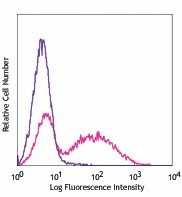
-

C57BL/6 splenocytes stained with AF6-120.1 Pacific Blue™
| Cat # | Size | Price | Save |
|---|---|---|---|
| 116421 | 25 µg | ¥18,870 | |
| 116422 | 100 µg | ¥45,930 |
The AF6-120.1 antibody reacts with the I-Ab MHC class II alloantigen. These class II molecules are expressed on antigen presenting cells (including B cells) and a subset of T cells from H-2b bearing mice, and are involved in antigen presentation to T cells expressing CD3/TCR and CD4 proteins. The AF6-120.1 antibody cross-reacts with H-2k and H-2u haplotypes; this antibody does not cross-react with other haplotypes (d, f, q, r, s).
Product DetailsProduct Details
- Verified Reactivity
- Mouse
- Antibody Type
- Monoclonal
- Host Species
- Mouse
- Immunogen
- C57BL/10J splenocytes
- Formulation
- Phosphate-buffered solution, pH 7.2, containing 0.09% sodium azide.
- Preparation
- The antibody was purified by affinity chromatography, and conjugated with Pacific Blue™ under optimal conditions.
- Concentration
- 0.5 mg/ml
- Storage & Handling
- The antibody solution should be stored undiluted between 2°C and 8°C, and protected from prolonged exposure to light. Do not freeze.
- Application
-
FC - Quality tested
- Recommended Usage
-
Each lot of this antibody is quality control tested by immunofluorescent staining with flow cytometric analysis. For flow cytometric staining, the suggested use of this reagent is ≤1.0 µg per million cells in 100 µl volume or 100 µl of whole blood. It is recommended that the reagent be titrated for optimal performance for each application.
* Pacific Blue™ has a maximum emission of 455 nm when it is excited at 405 nm. Prior to using Pacific Blue™ conjugate for flow cytometric analysis, please verify your flow cytometer's capability of exciting and detecting the fluorochrome.
Alexa Fluor® and Pacific Blue™ are trademarks of Life Technologies Corporation.
View full statement regarding label licenses - Excitation Laser
-
Violet Laser (405 nm)
- Application Notes
-
Additional reported applications (for relevant formats of this clone) include: immunohistochemical staining of frozen sections (acetone-fixed5; OCT-embedded, ethanol-fixed sections7), immunofluorescence microscopy3 (including acetone-fixed epidermal sheets6), immunoprecipitation7,8. Directly conjugated antibody was used for IF in (3) and (6) and for IHC in (5).
Does not react with other haplotypes (e.g., d, f, q, r, s). -
Application References
(PubMed link indicates BioLegend citation) -
- Wall KA, et al. 1983. J. Immunol. 131:1056. (FC)
- Cohn LE, et al. 1986. P. Natl. Acad. Sci. USA 83:747. (FC)
- Inaba K, et al. 1998. J. Exp. Med. 188:2163 (IF)
- Hamrah P, et al. 2002. Invest Opthalmol Vis. Sci. 43:639 (IF)
- Buono C, et al. 2003. Arterioscler. Thromb. Vasc. Biol. 23:454. (IHC)
- Wang Z, et al. 2004. J. Immunol. 172:5924. (IHC IF)
- Nakagawa TY, et al. 1999. Immunity 10:207. (IP)
- Podolin PL, et al. 2008. J. Immunol. 180:7989. (FC IP) PubMed
- Schneppenheim J, et al. 2013. J Exp Med. 210:41. PubMed.
- Product Citations
-
- RRID
-
AB_10613291 (BioLegend Cat. No. 116421)
AB_10613291 (BioLegend Cat. No. 116422)
Antigen Details
- Structure
- MHC class II
- Distribution
-
B cell and activated T cells, APCs of H-2b mice
- Function
- Antigen presentation
- Ligand/Receptor
- CD3/TCR, CD4
- Cell Type
- Antigen-presenting cells, B cells, T cells
- Biology Area
- Immunology, Innate Immunity
- Molecular Family
- MHC Antigens
- Antigen References
-
1. Watts C. 1997. Annu. Rev. Immunol. 15:821.
2. Pamer E, et al. 1998. Annu. Rev. Immunol. 16:323. - Gene ID
- 14961 View all products for this Gene ID
- UniProt
- View information about I-Ab on UniProt.org
Related FAQs
Other Formats
View All I-Ab Reagents Request Custom Conjugation| Description | Clone | Applications |
|---|---|---|
| Biotin anti-mouse I-Ab | AF6-120.1 | FC |
| FITC anti-mouse I-Ab | AF6-120.1 | FC |
| PE anti-mouse I-Ab | AF6-120.1 | FC |
| Purified anti-mouse I-Ab | AF6-120.1 | FC,IHC-F,IP |
| Alexa Fluor® 488 anti-mouse I-Ab | AF6-120.1 | FC |
| Alexa Fluor® 647 anti-mouse I-Ab | AF6-120.1 | FC |
| PerCP/Cyanine5.5 anti-mouse I-Ab | AF6-120.1 | FC |
| APC anti-mouse I-Ab | AF6-120.1 | FC |
| PE/Cyanine7 anti-mouse I-Ab | AF6-120.1 | FC |
| Pacific Blue™ anti-mouse I-Ab | AF6-120.1 | FC |
| APC/Fire™ 750 anti-mouse I-Ab | AF6-120.1 | FC |
| APC/Cyanine7 anti-mouse I-Ab | AF6-120.1 | FC |
| TotalSeq™-A1367 anti-mouse I-Ab | AF6-120.1 | PG |
| TotalSeq™-B1367 anti-mouse I-Ab | AF6-120.1 | PG |
| TotalSeq™-C1367 anti-mouse I-Ab | AF6-120.1 | PG |
Customers Also Purchased
Compare Data Across All Formats
This data display is provided for general comparisons between formats.
Your actual data may vary due to variations in samples, target cells, instruments and their settings, staining conditions, and other factors.
If you need assistance with selecting the best format contact our expert technical support team.
-
Biotin anti-mouse I-Ab
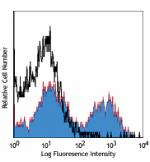
C57BL/6 mouse splenocytes stained with biotinylated AF6-120.... -
FITC anti-mouse I-Ab
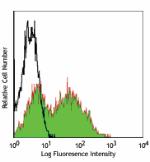
C57BL/6 mouse splenocytes stained with AF6-120.1 FITC -
PE anti-mouse I-Ab
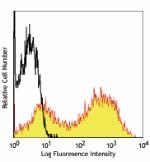
C57BL/6 mouse splenocytes stained with AF6-120.1 PE -
Purified anti-mouse I-Ab
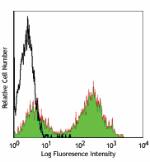
C57BL/6 mouse splenocytes stained with purified AF6-120.1, f... -
Alexa Fluor® 488 anti-mouse I-Ab
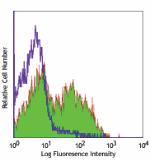
C57BL/6 mouse splenocytes stained with AF6-120.1 Alexa Fluor... -
Alexa Fluor® 647 anti-mouse I-Ab
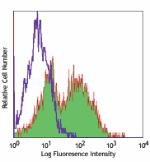
C57BL/6 mouse splenocytes stained with AF6-120.1 Alexa Fluor... -
PerCP/Cyanine5.5 anti-mouse I-Ab
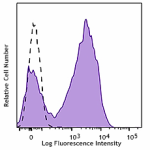
C57BL/6 mouse splenocytes were stained I-Ab (clon... -
APC anti-mouse I-Ab
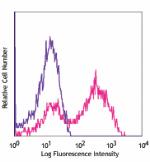
C57BL/6 mouse splenocytes stained with AF6-120.1 APC -
PE/Cyanine7 anti-mouse I-Ab
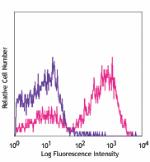
C57BL/6 splenocytes stained with AF6-120.1 PE/Cyanine7 -
Pacific Blue™ anti-mouse I-Ab
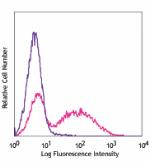
C57BL/6 splenocytes stained with AF6-120.1 Pacific Blue&trad... -
APC/Fire™ 750 anti-mouse I-Ab
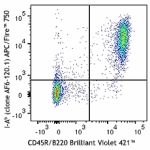
C57BL/6 mouse splenocytes were stained with Brilliant Violet... 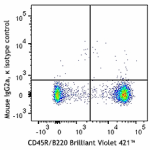
-
APC/Cyanine7 anti-mouse I-Ab

C57BL/6 splenocytes were stained with CD45R FITC and anti-mo... -
TotalSeq™-A1367 anti-mouse I-Ab
-
TotalSeq™-B1367 anti-mouse I-Ab
-
TotalSeq™-C1367 anti-mouse I-Ab









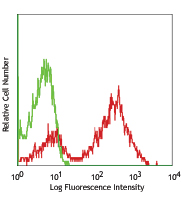
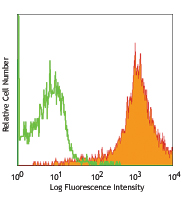
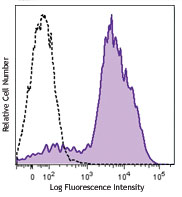
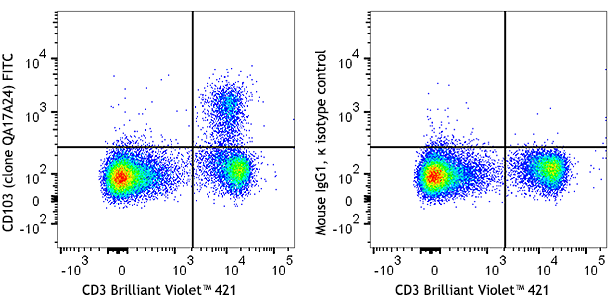



Follow Us